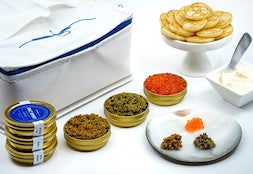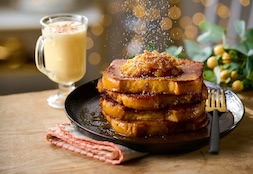Nobody can improve upon the daiquiri.
That was the sentiment given by Jonathan Downey, the proprietor of London's Milk & Honey, who spoke at an event I attended last month, celebrating the 10th anniversary of the World's 50 Best Bars list (Downey's topped it twice, in 2009 and 2010).
It came off as provocative, at first, because this event was partly conceived to honor innovation in the bar industry. But the more I thought about it, the more I realized that, of course, Downey was right. Nobody would ever make a more perfect cocktail than the daiquiri, because the daiquiri is already perfect—a strong and simple three-ingredient libation that follows the disappearing line between sour and sweet, refreshing and rich, right into your mouth.
As easy as it is to make daiquiris, however, it's just as easy to ruin them. One need only take a few sips of the machine-dispensed lump of frozen red stuff puddling at the bottom of a cartoonish coupe glass to understand the extent to which people will go to fuck up this seemingly un-fuck-up-able drink.
But you will not be one of those people. No. You will be the opposite of one of those people.
That's because we've sought the advice of Kevin Beary, the knowledgeable barkeep who just opened the Bamboo Room—a 22-seat daiquiri den ensconced inside the Chicago tiki mecca, Three Dots and a Dash. In addition to mixing coconut fat-washed whiskey drinks and force-carbonated Rum and Tings, they also make four different daiquiris. Each of them have their own house rum blend, and are served two ways: up or over a fluffy bed of Japanese shaved ice, itself composed of cold-pressed pineapple juice, Martinique cane syrup and filtered water.
Below, we've rounded up some of Beary's daiquiri-related wisdom, for you to consider next time you make them at home. We presume "next time" is "some time soon."
Daiquiris should have at least three different rums, you should be able to drink it in three sips, and you should be able to have three of them.
That may as well be Beary's Golden Rule of daiquiri making. Assuming you have properly prepared lime juice (1 oz) and a good sugar syrup (1/2 oz), the determining factor of the daiquiri is going to be the rum blend (2 oz). You want yours to showcase your ability to utilize different rums to make a well-balanced cocktail.
The biggest mistake people at home can make is thinking they can go to the store, buy one bottle of rum off the shelf and go home and make a daiquiri with it.
Of course, you can do that. It's just not recommended. Beary estimates that only about 2% of blended rums available at the average American liquor store are adequate for daiquiri-making (Plantation Rum being one). If you must buy only one bottle, make it a non-blended, relatively dry column-still aged rum, in the 8-to-12-year range. But if you're really serious about your daiquiris—and why shouldn't you be?—you'll want to pick up a few different bottles and craft your own house blend. That way, you can tell people you have a "house blend."
Beary's ideal daiquiri rum blend is...
-3/4 oz of a nice, funky Jamaican rum
-3/4 oz of a lightly aged rhum agricole (rhum is a kind of rum from Martinique, made from fermented sugar cane juice, as opposed to molasses)
-1/2 oz of a really dry, aged Cuban-style rum
With this combination, you wind up getting some good "funk" from the Jamaican rum, a grassiness from the rhum agricole and a traditional, even-keeled rum flavor from the Cuban-style rum. (You can find the exact rums Beary uses for his "Ideal Blend" listed on Bamboo Room's menu.)
Avoid stupid mistakes.
Don't pour your daiquiri (or your ingredients) over ice and let it dilute. Buy yourself a bottle of Martinique cane syrup or make yourself a rich, 2-to-1 simple syrup. And then just follow the proper technique—give the mixture a good, aggressive shake and double-strain it into a coupe glass. (For bonus points, chill the coupe glass beforehand.)
But don't be afraid to give it a twist.
For a complex, but lower ABV daiquiri, Beary recommends making a 50/50 blend of rum and a nice, bright sherry. It only sounds weird until you taste it. Promise.
And if you absolutely must have one of those frozen daiquiris...
Just don't call it a daiquiri. After all, Beary says, it's really a different cocktail, featuring a different proportion of ingredients and different flavor profile than that of a true daiquiri.






